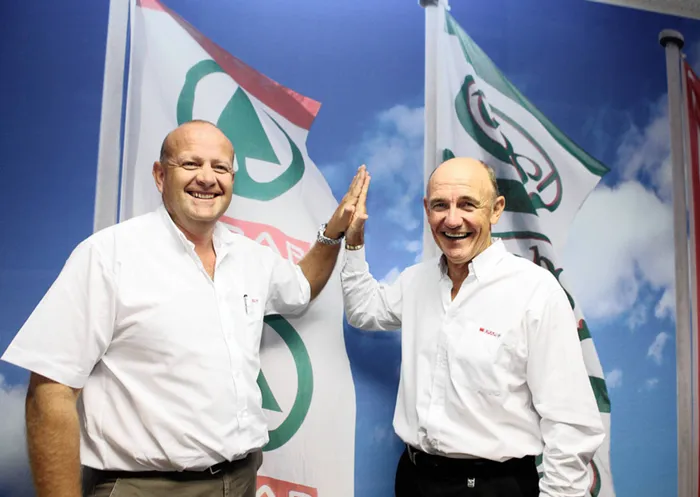Spar’s 50th year milestone in SA

DURBAN26032013 Rob Phillipson (Head KZN) and Wayne Hook CEO Spar.Picture:Marilyn Bernard DURBAN26032013 Rob Phillipson (Head KZN) and Wayne Hook CEO Spar.Picture:Marilyn Bernard
Fifty years ago the Spar retail concept arrived in South Africa and was written off by competitors at the time as a “seven-day wonder”. Today the KwaZulu-Natal-headquartered and JSE-listed Spar Group has sales of more than R45 billion.
This week Spar celebrates its 50th birthday in South Africa, and the milestone gives it an opportunity to launch its biggest marketing promotion and reflect on its incredible success and growth.
It also prompts the question of what the next 50 years holds for Spar, whose business model once shook up the food retail sector in South Africa. The market is now dominated by major players, which includes Spar, and the entry of Walmart is seeing an increase in competition.
Spar chief executive Wayne Hook, and Rob Philipson, managing director of Spar KZN, said in an interview with The Mercury that the company’s business model was what set it apart from competitors.
“Yes, it is a challenging economic environment in South Africa, with consumers under pressure, but at the heart of Spar is a solid business model. We are competing with the best in the sector,” said Hook.
“Spar does not operate like the other major players. We are essentially a wholesaler or distributor, offering a full range of support services to the Spar stores in the country, which are independently owned. Of the almost 900 Spar stores in South Africa, we only run about 10 of them… so the original business model launched 50 years ago still remains key to our success today.”
Hook, who was recognised as Mr Spar in 2001 when he was in Philipson’s position, has been at the helm of the Spar Group since 2006 and took over from Spar stalwart Peter Hughes. When Hook became chief executive, Spar’s retail sales stood at R24bn. Today, he is also a member of Dutch-based Spar International’s global board.
“Our annual retail sales today stand at R68bn from the various store brands under the Spar Group, including Spar, SuperSpar, Kwikspar, Savemor, Tops at Spar and Build It. Together we have 1 740 stores under the different brands,” he said.
Hook said the Spar Group directly employed about 4 000 people in its distribution, support and marketing side, but together all stores under the Spar Guild in SA employed about 65 000 people.
“Our business is based on essentially managing relationships. We have to ensure that we work in co-operation with our independent retailers. Their success is inextricably linked to ours.
“Each store is run by independent operators with their own personality and style of doing business, catering for their markets. This has been the cornerstone of our success. We offer these stores the supply of products and comprehensive marketing and operational support, which allows the independent retailer to trade against the big guys.”
Hook said the Spar system fostered entrepreneurship.
“The entrepreneurial drive by hundreds of Spar store owners who are members of the Spar Guild drives the growth of the Spar Group. Essentially they bring health to the system by challenging us, giving input on retail strategy, and bringing much-needed entrepreneurial flair,” he said.
Philipson said: “The Spar Group represents the biggest organisation of independent entrepreneurs in the country, so relationship management is crucial… We have a unique culture of informality that makes for an enjoyable work environment.
“This environment and relationship management are critical in a voluntary trading system where people belong to Spar because they want to and not because they have to by virtue of stringent franchise agreements.”
That was why Spar could not be described as a franchising business, Hook added.
“The Spar Group prides itself on being a strong wholesale and distribution operation. We have world-class distribution centres and distribution networks. They are slick operations aimed at servicing our independent retailers. We have a 345-strong fleet of trucks and some 400 trailers that travel 35 million kilometres a year delivering goods to Spar stores across the country.”
Hook said the success and growth of Spar in South Africa was strongly linked to KZN, which was why it had its headquarters there. After the Spar concept was launched in the country in 1963, the KZN operations under Independent Wholesalers played a leading role in growing the Spar concept. Eventually, through its successor companies, it took over all Spar operations in the country. Today the company is known as the Spar Group.
Philipson said the Spar distribution centre in Phoenix, which opened in 1985, was Spar’s second-biggest distribution centre in the country after Gauteng and was being expanded to a 49 000m2 dry facility, due to launch in August.
Hook said competition in the retail sector was tough and the “fight” was on for sites, but that expansion through new stores remained an opportunity for the group.
“Spar will not just jump at any available site as we have to consider the impact on existing retailers. Our priority is to focus on the organic growth in sales of existing stores… Further expansion into other African countries would be a focus for the future,” he said.
Speaking about management style, Hook said: “We are strong proponents of decentralisation, where management are expected to take responsibility, operate independently and to make the best decisions for their business. We try not to meddle too much from head office. And modesty, not arrogance, works best for us.”
He said Spar had a strong family-based culture and involved families where possible, particularly in activities with retailers.
“There is always time for fun in Spar… It’s a work hard, play hard organisation.”
Philipson added that the group was also sports mad, hence its sponsorship support of various sport codes. He even boasts a Sharks tattoo. - The Mercury